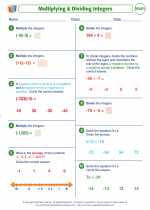Integer Operations Study Guide
Introduction to Integers
Integers are whole numbers (both positive and negative) and their opposites. They are used to represent quantities that can be greater than or less than zero.
Basic Operations
There are four basic operations when working with integers: addition, subtraction, multiplication, and division.
Addition of Integers
When adding integers, remember the following rules:
- If both integers have the same sign, add their absolute values and keep the sign.
- If the integers have different signs, subtract the absolute value of the smaller number from the absolute value of the larger number, and give the result the sign of the number with the larger absolute value.
Subtraction of Integers
Subtracting integers follows similar rules to addition, but it's important to remember that subtracting a negative integer is equivalent to adding a positive integer.
Multiplication and Division of Integers
When multiplying or dividing integers, the sign rules are as follows:
- If the integers have the same sign, the result is positive.
- If the integers have different signs, the result is negative.
Word Problems
Integer operations are often used to solve real-world problems involving finances, temperatures, and other situations where values can be positive or negative. It's important to carefully analyze the problem and apply the appropriate operation.
Practice Problems
Here are some practice problems to help you master integer operations:
- Calculate -5 + 8
- Find the product of -4 and -6
- If a temperature drops 10 degrees from 5°C, what is the new temperature?
Remember to always practice and review the rules for integer operations to build your proficiency in this topic.
Good luck with your studies!
.◂Math Worksheets and Study Guides Eighth Grade. Integer operations
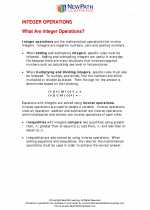
 Worksheet/Answer key
Worksheet/Answer key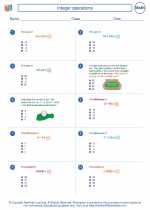
 Worksheet/Answer key
Worksheet/Answer key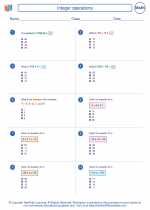
 Worksheet/Answer key
Worksheet/Answer key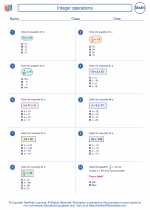
 Worksheet/Answer key
Worksheet/Answer key